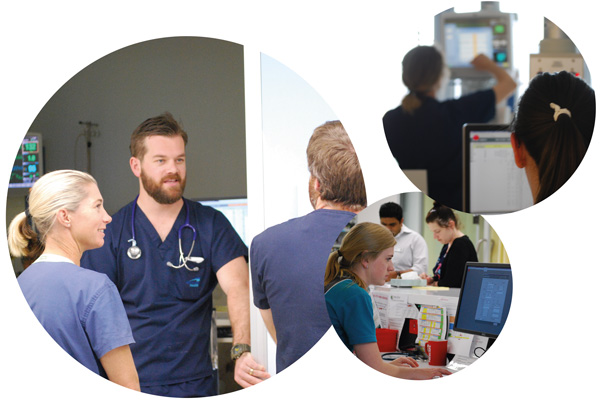Staff in the ICU
 In addition to doctors and nurses, there are a variety of people who work in the Intensive Care Unit (ICU) – including physiotherapists, dieticians, speech therapists and other support staff.
In addition to doctors and nurses, there are a variety of people who work in the Intensive Care Unit (ICU) – including physiotherapists, dieticians, speech therapists and other support staff.
Doctors in the ICU are also referred to as Intensivists. They are specialists who have completed advanced training in intensive care medicine or a related speciality such as anaesthetics, cardiology or emergency medicine. They are responsible for coordination of patient care in the ICU and will consult with other specialists.
There is usually an ICU Consultant leading a team of doctors who normally examine patients on a daily basis to assess their progress and decide all aspects of treatment and care.
Nurses in the ICU usually look after just one or two patients only. Many have special experience, education and training in caring for critically ill and injured patients. They work with the doctors and other healthcare professionals to ensure all the patient’s needs are met in terms of treatment, care and comfort. Their role is to give the drugs and fluids prescribed by the doctors, monitor a patient’s blood pressure, heart rate and oxygen levels, allowing for early identification of changes in a patient’s condition. In addition, nurses are responsible for keeping the patient as comfortable as possible in practical ways such as changing sheets, cleaning teeth, regularly washing and turning the patient, and generally attending to their needs.
Physiotherapists attend to patients in ICU (often when they are asleep) to exercise muscles in their arms and legs to prevent joints from becoming stiff and, sometimes to help strengthen the chest muscles and lungs of patients who need help with breathing while in ICU. And they are there to help recovering patients with exercises to aid their physical strength after a long period in bed, preparing them to become mobile again.
Dieticians work out patients’ nutritional needs and how best they will be fed. Sometimes this can be through a nasogastric tube (a tube that goes up the nose and down into the stomach) or through a drip straight into the vein.
Speech therapists may also be involved, especially if a patient has a tracheostomy. (A tracheostomy is a procedure to make a hole in the throat and insert a tube, which is connected to a ventilator or ʻbreathing machineʼ.) Later, the speech therapist may recommend a speaking valve on the tracheostomy.
Pharmacists attend ward rounds and assist doctors and nurses with advice regarding medications as well as ensuring a supply of medication for patients.
Occupational therapists evaluate the ability of the patient to carry out everyday activities of daily living and develop treatment plans to improve the patient’s abilities
Social Workers are available at most large hospitals. They provide invaluable support for families of critically ill including counselling and assistance with financial matters such Centrelink.
